On July 29, 2019, during the events of the Summer of ‘19, in a cafe in Guaynabo, three FBI agents interviewed Raymond Cruz Hernández, at the time administrator of Ricardo Rosselló Nevares’s political committee.
The Center for Investigative Journalism (CPI, in Spanish), in alliance with Las Noticias de TeleOnce’s Investigative Unit and Metro Puerto Rico, had access to the report that states what Cruz Hernández said then, according to the FBI, and that had not been revealed until now.
Cruz Hernández said that between July 11 and 14, 2019, when he was still working as a special aide in the government house, La Fortaleza, Rosselló Nevares discussed with him the strategy to address the crisis that was emerging after the publication of the Telegram chat. Cruz Hernández said that back then, Chief of Staff Ricardo Llerandi, Secretary of Public Affairs, Anthony Maceira, and Carlos Mercader, who had been director of the Puerto Rico Federal Affairs Administration (PRFAA) until April 2019, were also present. According to Cruz Hernández, Mercader suggested hiring a stateside firm to handle the Telegram chat crisis through the media. The company, whose name Cruz Hernández said he did not know at the time, would charge $300,000 for this work. He later learned that the company recommended by Mercader was O’Melveny & Myers, the law firm that since 2017, represents the government of Puerto Rico in the bankruptcy case under the PROMESA Act and that specializes in corporate law.
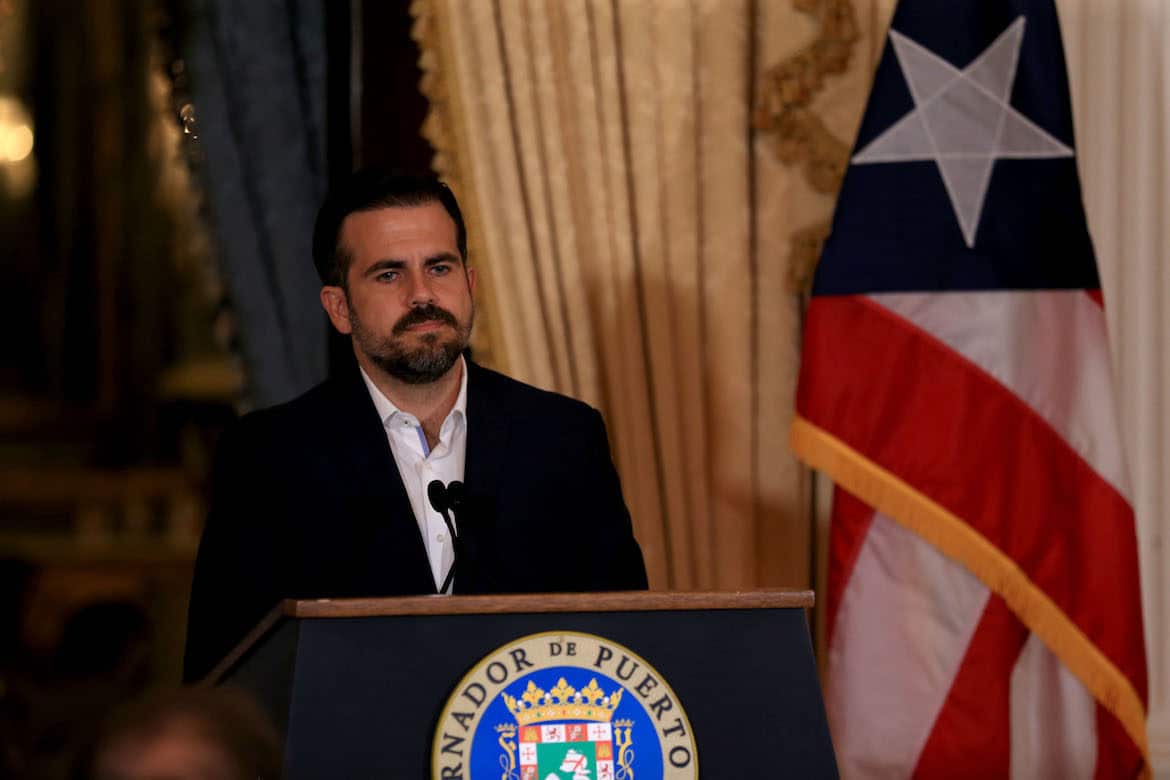
Photo by Gabriel López Albarrán | Centro de Periodismo Investigativo
However, Rosselló Nevares hired producer and now convicted Sixto Jorge Díaz Colón, known as “Sixto George,” to handle the crisis from the media’s side. As several sources interviewed for this investigation have said, Cruz Hernández told the FBI that Rosselló Nevares authorized the hiring, as well as the two payments of $90,000 each, that his political committee made to Sixto George through his company D.R. Consulting Corp.
There is no written contract documenting the duration and terms of this arrangement. It was a verbal agreement, according to what the producer said in an impromptu press conference upon leaving the federal court when the trial against him was seen in February of this year after being accused at the federal level of extorting Maceira in exchange for preventing the publication of the chat. Maceira did not want to speak to TeleOnce aboutL this story that is being published in alliance with the CPI and Metro.
Sixto George was convicted on charges of extortion, attempted extortion, and destruction of evidence. Last Tuesday, April 11, Sixto George’s sentencing hearing, which had been scheduled for May 5, was postponed. Through a source who requested anonymity for fear of reprisals, the CPI, TeleOnce and Metro had access to part of the documents that the federal prosecutor’s office shared with Díaz Colón’s defense during the trial discovery process. The documents offer details of what was going on behind the scenes before and after Rosselló Nevares’s resignation during the Summer of ‘19.
The committee paid $200K to spread the idea that Rosselló Nevares should stay in La Fortaleza
According to D.R. Consulting, their work included the use of influencers and Facebook groups, who were told to say the protests affected the arrival of cruise ships as well as economic and social stability, and the danger they posed to security in Old San Juan due to an underground gas line that passes through, the company says in a report on the services it provided between July 13 and August 2, 2019.
This report — which is missing a page— along with two invoices from D.R. Consulting and other documents related to the investigation against Sixto George, and which were confidential until then, was recently made public after being attached to a motion filed by Sixto George’s defense in February.
D.R. Consulting’s first invoice is dated July 13 — the same day the Telegram chat went public. It includes as services provided the development of a strategy, the creation of a web page, management of social media platforms, writing communiqués “to be disseminated”, and consulting on “communications issues,” according to the document that is part of the case file against Sixto George. According to the report submitted by the Rosselló Nevares’ campaign committee to the Electoral Comptroller’s Office (OCE, in Spanish), the first $90,000 payment to D.R. Consulting — after a tax withholding of $10,000 — went through on July 17.
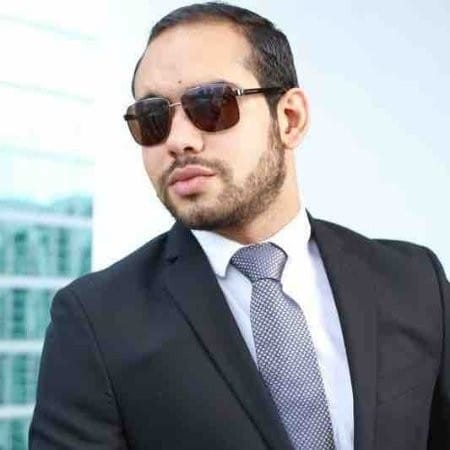
Photo from Linkedin
Then a second invoice came in, again for $100,000, and with so little information that it had to be reviewed, Cruz Hernández said, since it did not have enough information to show the services provided. The invoice dated July 20, which is also in the court file, is for the same services as the first.
The invoices were submitted so quickly, one after the other, that Rosselló Nevares’s campaign treasurer, Javier Oyola Alemañy, thought it was a mistake, Cruz Hernández added. Rarely had the committee paid this amount of money to any contractor. Also, the work done by D.R. Consulting wasn’t even evident, said Cruz Hernández, while the street protests continued and the image of the former governor only worsened, contrary to what Sixto George promised.
Even so, Rosselló Nevares approved the payment of both invoices, the former special aid and committee administrator assured the feds. On July 23, the committee issued a second check in favor of D.R. Consulting, again for $90,000.
Immediately afterward, Rosselló Nevares decided to resign, Cruz Hernández said. He recalled that he called Oyola Alemañy to cancel that second check, but the reaction was late because they had already cashed it at the bank. Oyola Alemañy died from a heart condition in April 2020, during the process of closing the ex-governor’s committee.
When the FBI interviewed him in December 2020, and as the CPI reported, the former Governor said his campaign committee evaluated Sixto George’s proposal, that the work was ineffective, and that when the producer asked for more money, he refused to pay it. Rosselló Nevares said Sixto George’s strategy was to use people in the media to speak favorably of him, get some media time to give his version, and hold a march in favor of his permanence.
Of the $180,000 the committee paid to D.R. Consulting, Sixto George received $46,000, according to a document in the case. The CPI questioned the producer, through his lawyer Rafael Castro Lang, about the rest of this money, whether it was used to pay influencers or people in the media, and what exact services D.R. Consulting provided, but got no response.
Rosselló Nevares told the FBI that he did not remember how Sixto George became an option to handle the crisis, and that he knew of a single payment of $100,000 to the producer. About Cruz Hernández, the former Governor said he was unaware of the scope of his work in his political committee. In the committee reports of the former president of the New Progressive Party, Cruz Hernández appears as his administrator.
Between Rosselló Nevares and Sixto George, at least three people close to the former governor intervened: Maceira, former Chief of Staff Llerandi, and committee treasurer Oyola Alemañy, according to the documents that the CPI examined. According to Cruz Hernández, it was Llerandi who met Sixto George on at least one occasion, representing Rosselló Nevares, and who told him that D.R. Consulting wanted to get paid in cash. Cruz Hernández stressed he said that the payment would only be possible by check, since the laws require invoices and details of the use of electoral funds.
Cruz Hernández told the feds that he got a call from Llerandi on July 29 in which he noticed he was nervous and angry.
Cruz Hernández suspected that Llerandi was asked to say that the payments made were his (Llerandi’s) fault, or not to mention the Governor in anything related to the two $100,000 payments, according to the FBI report.
The CPI tried to reach Llerandi for this story but was unable to contact him.
Mercader lobbied in favor of AAFAF contractor to work on a political crisis
Cruz Hernández told the FBI that on July 31, a week after Rosselló Nevares resigned, he received a Telegram message from Mercader, in which he asked about the political committee’s hiring process.
According to Rosselló Nevares’ former special aid, Mercader wanted the O’Melveny law firm to provide crisis management services for one year at a cost of $300,000, which Cruz Hernández said would represent a potential conflict of interest because of the firm’s relationship with the government. In addition, Cruz Hernández said it did not make sense since Rosselló Nevares had resigned, but Mercader insisted that there was still work to be done. Mercader then said that the contract would be for $30,000 per month, for six months.
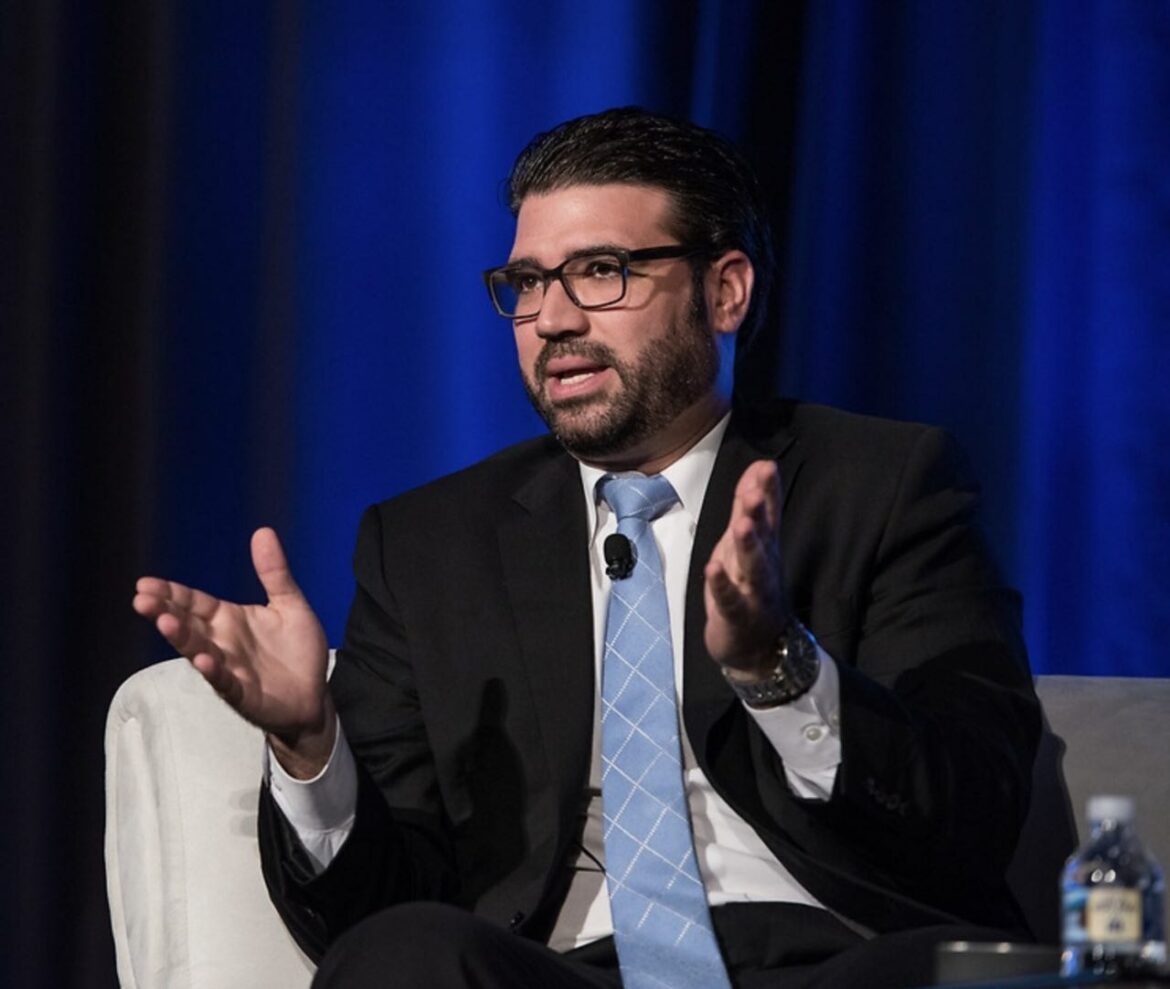
Archives
An invoice from O’Melveny for part of its work on the Puerto Rico bankruptcy includes a four-hour July 16 meeting between several lawyers for the firm and Mercader. The matter of the meeting is crossed out. At that time, Mercader, who was no longer a public official because he had resigned three months earlier as director of the PRFAA, was part of the group that accompanied the Governor during the Summer of ‘19.
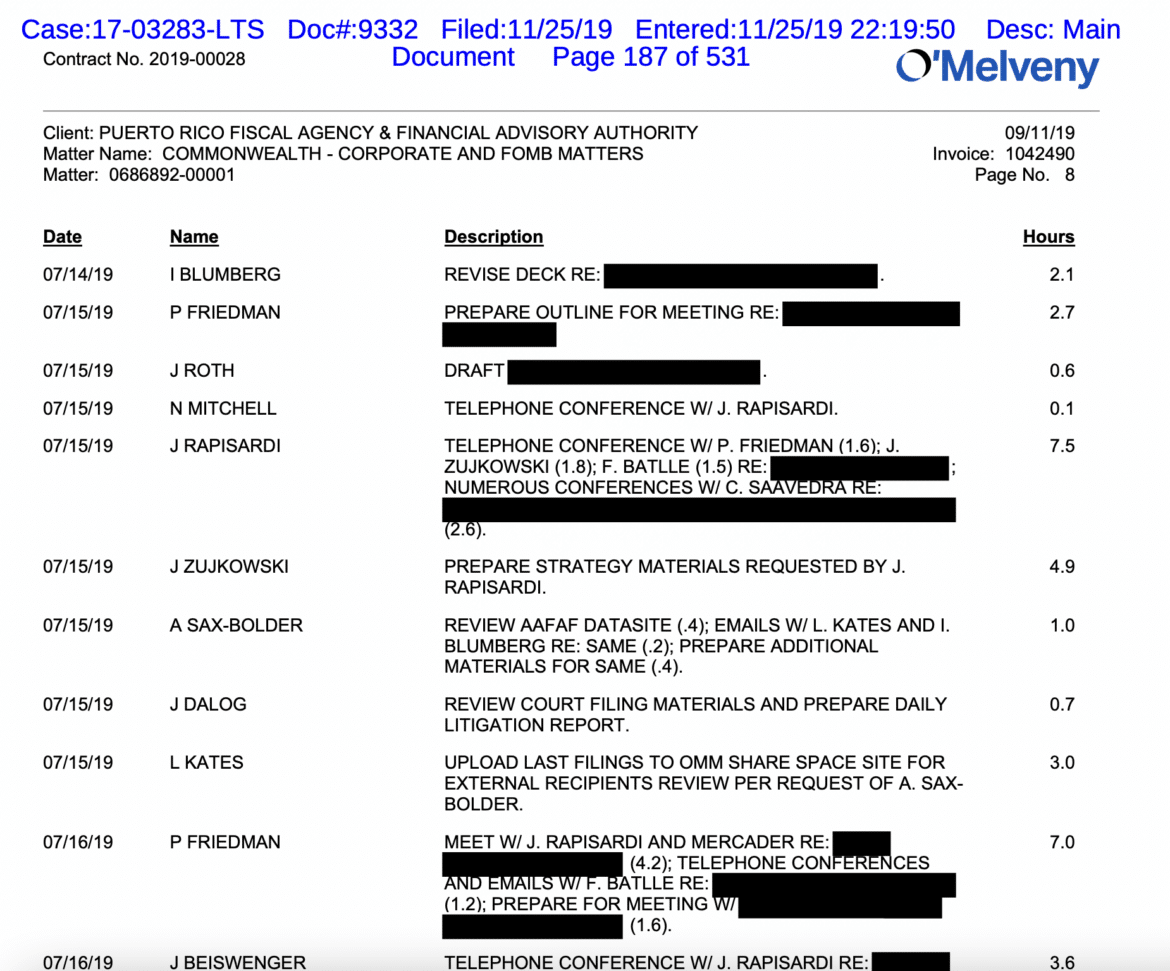
The CPI asked O’Melveny if it hired Mercader as a lobbyist before Rosselló Nevares but got no response.
As Committee administrator, Cruz Hernández asked Mercader for a proposal for O’Melveny’s services, and warned him that the OCE would have to approve this contract. In addition, the campaign funds of the Rosselló Nevares Committee would be available for only another six months. At the time, the committee had about $1.6 million, while it was $700,000 in debt, according to the FBI report. Once the committee was dissolved, if there were a surplus, it would go to the Treasury Department.
Cruz Hernández told the FBI that two days after Mercader’s approach, he got a call from Rosselló Nevares, who asked him if he had spoken with the former director of the Federal Affairs Office. He said that immediately afterward, Mercader called him and said he would submit a proposal for O’Melveny’s services and that he would try to further reduce the amount of the contract.
“CRUZ felt that ROSSELLO was not trying to hire O’Melveny for any legally authorized reason”, according to the FBI report that includes the conversation with the former La Fortaleza employee on August 1, 2019. The reports submitted to the OCE stated that the Rosselló Nevares committee did not hire O’Melveny.
Mercader was contacted for a reaction to the suggestion that he intervened in favor of a contract for this law firm, but he did not respond to calls or messages.
A request for comment sent to O’Melveny’s communications office also went unanswered.
Feast at Il Postino
On the night of Monday, July 15, Maceira dined with Sixto George at the bar of the Il Postino restaurant in Miramar. They ordered two 12-year-old Macallan whiskies, on the rocks, cuttlefish croquettes with squid ink, a churrasco with potatoes, and a filet tip risotto and chorizo to share.
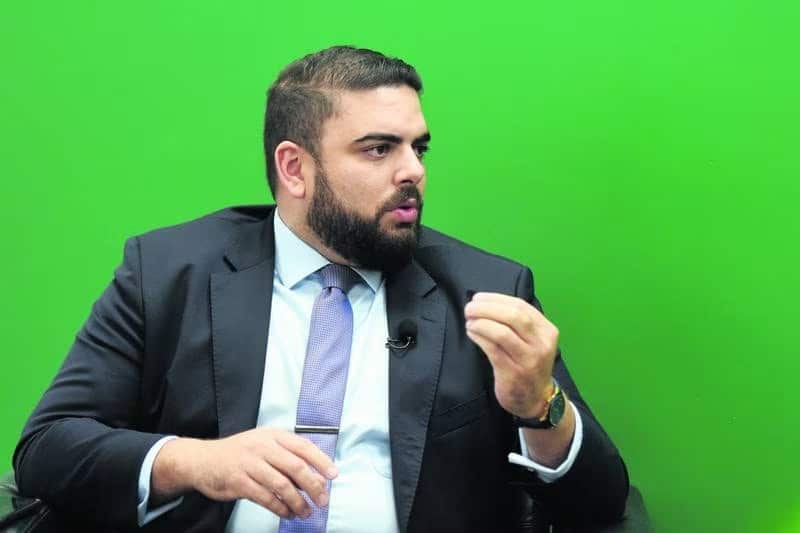
Photo by Dennis A. Jones | Metro Puerto Rico
The meeting was recorded by the FBI microphone that Maceira, then La Fortaleza’s Secretary of Public Affairs, had hidden. The CPI got a copy of the transcript of this meeting, which is in the Sixto George case file.
At that time, Sixto George already had an agreement with Rosselló Nevares to handle the crisis in his administration after the revelation of the Telegram chat.
“Damn, you’re like… You didn’t know that?” said the producer, referring to the arrangement he had with Rosselló Nevares. Maceira answers: “No, obviously I didn’t know.”
Sixto George tells him to be calm and warns him: “I didn’t tell you this, you don’t know anything. Pretend this is new to you. Please pretend this is new to you, cabrón. Don’t throw me under the bus.”
Earlier during the dinner, Maceira had asked about the people in the media that Sixto George claimed to control and who had “appeal to the conversation of the masses.” The producer said Kobbo Santarrosa and Jorge Pabón, “El Molusco,” asked him for money in exchange for “wording” the message in favor of Rosselló Nevares. Pabón denied this accusation in written statements to the CPI.
In the case of the puppeteer, Sixto George assured that to include him in the plan he was running, he had to be paid $50,000. “Kobbo told me: ‘Sixto, you know how this works. When you sit down with me, don’t disrespect me,’” he said. On local television, Santarrosa produces and embodies the character of La Comay in a gossip show that since January 2019 has aired on the MegaTV station, owned by Spanish Broadcasting System Inc. (SBS).
Sixto George also said the source to make this type of payment would be the campaign committee.
About Pabón, the producer said: “Molusco is on a trip. Molusco also asked me for money. ‘Papi, if you want me to stop… But don’t give me shit, cabrón.” Pabón is one of the most popular figures on Puerto Rican radio and has millions of followers on his social media platforms and on YouTube. During the summer of 2019, he was one of the well-known figures who issued messages of indignation over the conversations revealed in the chat and pressed to continue the protests against the governor.
In statements to the CPI, Pabón assured that “I never had a conversation with Sixto George in which I asked him for money to speak well or ill of Ricardo Rosselló.” He added that Sixto George no longer worked as his producer, “so communication between us had faded.”
“I never asked for money to speak favorably about the Governor at that time. My record before and after the summer of ‘19 is there,” Pabón said.
The CPI contacted Santarrosa but got no response. In June 2022, through La Comay, Santarrosa called Sixto George’s accusations slander, and denied having requested or received $50,000 in exchange for speaking in favor of Rosselló Nevares.
Money in hand, Sixto promised he would run the show
“Cabrón, are they all as expensive as Kobbo?” Maceira asked. Sixto George said no and that in the case of Rocky The Kid, for example, it would cost $6,000. Rocky the Kid’s given name is Roque José Gallart Ortiz, who for several decades has worked in Puerto Rican radio and television. He was also the host of a show on MegaTV.
The CPI also requested a reaction from Gallart Ortiz but did not get a response at press time.
Sixto George also offered ideas to counter the chat’s public release. He said a message had to be conveyed that Rosselló must be ousted, but in the 2020 elections. Then they would change that narrative, through “unbelievable projects.”
The producer said he told Rosselló Nevares to go directly to Douglas Leff (FBI director in San Juan) and ask him about the officials who were committing crimes, to fire them. “But say it, don’t wait for the arrests to come out and then say you’re going to fire them. Say it now, dammit,” said Sixto George.
“And if Ricardo gets that done, you’ll then invite Douglas Leff to the show?” Maceira asked. Sixto George said “sure.” “And will you ask him the right questions?” insisted Maceira.
“Dude, we’ll run the show,” said Sixto George.
At one point in the evening, Maceira reflected on the chat post. He recalled that he resigned that same Saturday, but that the Governor did not accept his resignation. “I’m 30 years old. I got into the government really wanting to check that off, you know, but also to come out better than I began,” said Maceira, who said he did not want the position of Secretary of Public Affairs. “I don’t know squat about the media,” said the lawyer by profession. “Idealism reaches a point and the thing I’m most terrified about is that the fucking chats keep coming out.”
After Rosselló Nevares’s forced resignation, Maceira was the only member of the chat who remained on the public payroll as a cabinet member as head of the Ports Authority, until he was fired in November 2019 by then-governor Wanda Vázquez Garced. When Rosselló Nevares left office, Maceira left La Fortaleza, but stayed with Ports, a position he had held on to when he was appointed Secretary of Public Affairs. In 2020 he had two contracts with the Senate to provide legislative advice.
Maceira, who was the main witness for the federal prosecution in the trial against Sixto George, said he was in more than 100 chats with the Governor and other government officials. “Today, after I’ve been deleting for days, I’m going on fifty-something,” Maceira said in the recording.
The former official recalled how, after the first pages of the chat were published, he asked the group if there was anything worse than what had already come out. They said this was a preview of the full chat, but the worst had already been published. “This was after telling me that it was ‘photoshopped,’ and a lot more bullshit,” said Maceira.
“But there were definitely things worse than that, so I don’t 100% trust when they say that there are no more chats or that they are not in that tone,” said Maceira.
“It seems to me that more chats are coming,” Sixto George said. “That it’s a threat strategy; a scare tactic,” he added.
When that conversation happened, it had been two days since the CPI had published 889 pages of the chat in which, in addition to the Governor, Llerandi and Maceira, the former Secretary of Public Affairs, Ramón Rosario; the former representative of the government before the Fiscal Board, Elías Sánchez Sifonte; the former chief financial officer and former Treasury Secretary, Raúl Maldonado; the Secretary of State, Luis Rivera Marín; the former legal adviser to the Governor, Alfonso Orona; the main financial officer and representative of the government before the Board, Christian Sobrino; public relations officials Carlos Bermúdez and Rafael Cerame; and publicist Edwin Miranda, participated.
¡APOYA AL CENTRO DE PERIODISMO INVESTIGATIVO!
Necesitamos tu apoyo para seguir haciendo y ampliando nuestro trabajo.


